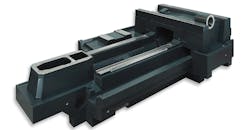Making cast parts "smart" — as seemingly every industrial and consumer product is now — is something of a word game: there are efforts to incorporate sensors or other responsive devices into cast components, and that is mostly a "research and development" stage effort. Making smart castings is rather more in the “commercial development” phase: After two years of development, Schneeberger Mineralgusstechnik is set to introduce a new design and production capability it indicates will support its customers’ digitalization strategies, and this effort manages to be smart in both ways.
Schneeberger is a Swiss manufacturer of linear motion technologies (guideways, slides, and tables) that are incorporated into industrial machinery. An affiliate business designs and builds CNC machine tools.
In parallel to this, Schneeberger has specialized the process of mineral casting —forming composite or resin concrete shapes, the principle use for which are as the foundations for production machinery, like CNC machine tools. These shapes are formed from inorganic mineral elements together with a high-performance thermosetting resin, resulting in a vibration-dampening structure on which the machinery is built.
Mineral castings have gained significant market share over gray iron and other cast materials, as well as welded steel structures. As a structural element for machine tools, mineral castings are critical to the machine’s performance. While the effective damping properties and thermal stability were initially considered to be mineral castings’ main design features, other aspects are important too.
Having developed this expertise, Schneeberger Mineralgusstechnik now is offering machine-building customers more design freedom and better component integration with its in mineral castings.
Engineering and producing castings to specification for machine builders, who work under contract from machine shops and other manufacturers, is an arrangement generally described now in terms of the information and service being provided — i.e., Industrial Internet of Things or Industry 4.0. — where value is created by the flexibility of the suppliers.
“This is not just the case with regard to manufacturing and delivery,” Schneeberger noted, “as we increasingly view flexibility as a challenge in terms of development as well … we need to be able to respond more quickly to individual customer requirements, and we have to do so in cooperation with our highly valued customers/business partners."
Digitalization, the functions that allow machines to interact with each other, has been a major feature of machine tools for over a decade. Every CNC machine tool is equipped with sensors for monitoring and controlling, and the data generated by these devices is used continuously to improve processes and performance.
What Schneeberger aims to do is to operate as a digital enterprise, interactively as a supplier with its customers. “We have set ourselves the goal of being able to support our customers with the ‘development of an optimal design for the machine bed’ for every specific requirement and/or application. To this end, we need to understand what processes occur on a machine bed during operation under diverse load conditions and in various configurations. In other words, we need a 'machine bed that gives us feedback.' "
So, Schneeberger Mineralgusstechnik has developed a digital measurement kit ("Mess-Kit") that can be custom-integrated into a mineral casting and remain there to measure various physical parameters as required – point by point or continuously. It allows the casting producer to collect data on loads and factors that have an effect on the bed from within the complex machine tool as a whole, during installation, assembly, or in operation. This is information that may be instructive to the machine operators and designers, too. It also will be possible to customize Schneeberger's Mess-Kit in line with specific situations and applications, and to measure temperature, stress, pressure, expansion, damping, etc., from within the bed.
The Mess-Kit is embedded in the mineral casting bed, and its sensors are both optimally positioned and fully protected against the working environment. It’s a customized product — customized sensors, data analysis and interpretation of influencing factors; customized behavior analysis; and customized recommendations for the design of the "optimal machine bed" for each machine.
